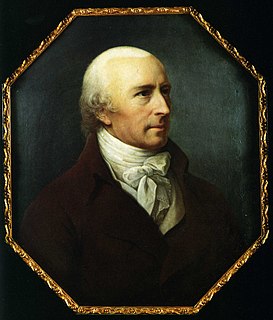Related Research Articles

Friedrich Albert Lange was a German philosopher and sociologist.

Landgrave was a noble title used in the Holy Roman Empire, and later on in its former territories. The German titles of Landgraf, Markgraf ("margrave"), and Pfalzgraf are in the same class of ranks as Herzog ("duke") and above the rank of a Graf ("count").

Joachim Heinrich Campe was a German writer, linguist, educator and publisher. He was a major representative of philanthropinism and the German Enlightenment.
Hartmut Boockmann was a German historian, specializing in medieval history.

The lokator was a medieval sub-contractor, who was responsible to a territorial lord or landlord for the clearing, survey and apportionment of land that was to be settled. In addition, he hired settlers for this purpose, provided their means of subsistence during the transitional period and made materiel and implements available, such as seed, draught animals, iron ploughs, etc. He thus played a key role during the establishment of new towns and villages, as well as the clearing of uncultivated land during the phase of internal colonisation (Binnenkolonisation) in North German and the German Ostsiedlung and participated in its success.

Rudolf Schieffer was a German historian specializing in medieval history. From 1994 to 2012 he was president of the Monumenta Germaniae Historica.
Lutz E. von Padberg is a German historian whose specialty is medieval history and in particular the Christianization of the Germanic peoples. He is an expert on Saint Boniface, having written biographies of the saint and studies of his veneration.
Horst Wolfgang Böhme is a German archaeologist with a focus on Late Antiquity / Early Middle Ages and research into castles.

Lorenz Hubert Weinrich is a German historian.
Heide Wunder is a German historian.

Eva Schlotheuber is a German historian of Christianity in the Middle Ages.
Gerhard Menk was a German historian and archivist.
Johannes Kunisch was a German historian. He held chairs of early modern history at the Goethe University Frankfurt. (1972-1976) and the University of Cologne (1976–2002). Through his publications Kunisch became one of the leading German early modern historians. His biography Frederick the Great, published in 2004 and widely acclaimed, gave lasting impulses to Prussian research.
Helmut Neuhaus is a German historian who specialises on the Early modern period. From 1989 to 2009 he held the Chair of Modern History I at the University of Erlangen–Nuremberg.
Peter Baumgart is a German historian.
Gerd Althoff is a German historian of the Early and High Middle Ages. He presents himself as a researcher into the "political rules of the game" in the Middle Ages. He has held professorships at Münster, Gießen (1990–1995) and Bonn (1995–1997).
Ludwig Petry was a German historian.
Gustav Mensching was a German theologian who was Professor of Comparative Religious Studies at the University of Bonn from 1936 to 1972.
Günther Binding is a German art historian and retired professor of art history and urban conservation at the University of Cologne.
Hartmut Hofrichter is a German architect, architecture historian, historic preservationist and academic teacher.
References
- ↑ Hoffmann, Hartmut (1996). "Nachruf: Helmut Beumann". Deutsches Archiv für Erforschung des Mittelalters (in German). 52: 397–98.
- ↑ Anne Christine Nagel: Im Schatten des Dritten Reichs. Mittelalterforschung in der Bundesrepublik Deutschland 1945–1970. Göttingen 2005, S. 38, Anm. 48.
- ↑ Ehlers, Joachim (1980). "Rev. of Jäschke, Wenskus, Festschrift für Helmut Beumann zum 65. Geburtstag". Historische Zeitschrift . 231 (1): 117–21. JSTOR 27621791.